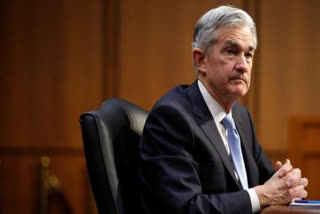Washington (US):The US Federal Reserve on Wednesday (local time) raised interest rates by 75 basis points (bps) or three-quarters of a percentage point in the boldest move since 1994. It's the largest rate hike since 1994 and will affect millions of American businesses and households, pushing up the cost of borrowing for homes, cars and other loans in order to force a slowdown in the economy.
The American economy, like others in the world, is facing high inflation and the pace is hitting a 40-year high. In an aggressive move to tackle white-hot inflation that is plaguing the economy, frustrating consumers and stifling the Biden administration, the interest rates have been raised. Until this week, economists and investors had expected the Fed to raise its benchmark interest rate by half a point, the second such move in the last 22 years.
However, after a disastrous inflation report revealed that price hikes are broadening across the entire economy, expectations rose for a more dramatic rate hike. In a post-meeting news conference, Federal Reserve Chairman Jerome Powell acknowledged that a three-quarter-point rate hike "is an unusually large one." While Fed officials "do not expect moves of this size to be common," Powell said. He further noted that the central bank would likely discuss raising rates by 75 basis points or just 50 basis points at its next meeting, on July 26-27.
Also read:Chinese President Xi turns 69 as he is all set for a rare 3rd term in power, perhaps for life
The US stock market rallied after the announcement, with the Dow up more than 500 points as investors interpreted the central bank's actions as a solid commitment to bringing down inflation, reported CNN. According to a statement released Wednesday by the Federal Open Market Committee, the voting arm of the central bank, 10 out of 11 voting members were in favour of the hike. One lone dissenter, Kansas City Fed President Esther George, voted for a half-percentage-point hike.
The committee said in its statement it was "strongly committed to returning inflation to its 2 per cent objective." This is likely intended as a response to criticism that the Fed has been behind the curve in tackling the nation's inflation problem. It also indicates that more aggressive hikes are not off the table, reported CNN. The central bank also decreased its economic projections for 2022, stoking recessionary fears: The Fed's median GDP forecast for 2022 is now 1.7 per cent, down significantly from 2.8 per cent in March.
Notably, the Fed does not predict a decrease in inflation this year and sees unemployment rising to 3.7 per cent in 2022, higher than its March prediction. When the pandemic first hit the United States, the Fed rolled out a series of emergency measures to support the economy, including slashing its interest rate to zero, making it almost free to borrow money. But while that "easy money" policy encouraged spending by households and businesses, it also fed inflation and contributed to today's overheated economy.
Now that the economy no longer needs support from the Fed, the central bank has been taking steps to "remove the punch bowl" and slow down the economy by aggressively hiking interest rates. Moreover, the rise in interest rates is going to adversely affect India as foreign portfolio investors are pulling out their money from the Indian market. (With Agency Inputs)
